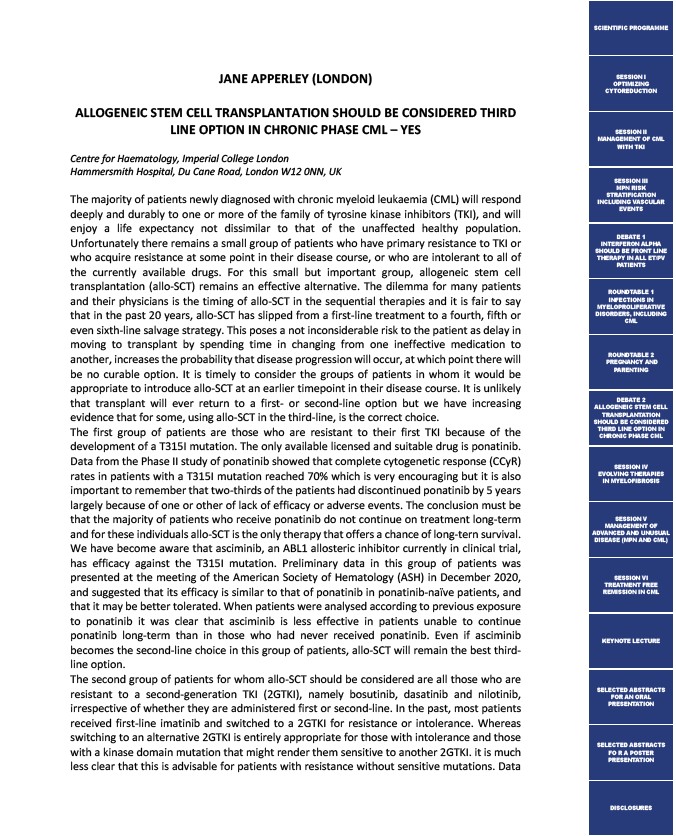
JANE APPERLEY (LONDON)
ALLOGENEIC STEM CELL TRANSPLANTATION SHOULD BE CONSIDERED THIRD
LINE OPTION IN CHRONIC PHASE CML – YES
Centre for Haematology, Imperial College London
Hammersmith Hospital, Du Cane Road, London W12 0NN, UK
The majority of patients newly diagnosed with chronic myeloid leukaemia (CML) will respond
deeply and durably to one or more of the family of tyrosine kinase inhibitors (TKI), and will
enjoy a life expectancy not dissimilar to that of the unaffected healthy population.
Unfortunately there remains a small group of patients who have primary resistance to TKI or
who acquire resistance at some point in their disease course, or who are intolerant to all of
the currently available drugs. For this small but important group, allogeneic stem cell
transplantation (allo-SCT) remains an effective alternative. The dilemma for many patients
and their physicians is the timing of allo-SCT in the sequential therapies and it is fair to say
that in the past 20 years, allo-SCT has slipped from a first-line treatment to a fourth, fifth or
even sixth-line salvage strategy. This poses a not inconsiderable risk to the patient as delay in
moving to transplant by spending time in changing from one ineffective medication to
another, increases the probability that disease progression will occur, at which point there will
be no curable option. It is timely to consider the groups of patients in whom it would be
appropriate to introduce allo-SCT at an earlier timepoint in their disease course. It is unlikely
that transplant will ever return to a first- or second-line option but we have increasing
evidence that for some, using allo-SCT in the third-line, is the correct choice.
The first group of patients are those who are resistant to their first TKI because of the
development of a T315I mutation. The only available licensed and suitable drug is ponatinib.
Data from the Phase II study of ponatinib showed that complete cytogenetic response (CCyR)
rates in patients with a T315I mutation reached 70% which is very encouraging but it is also
important to remember that two-thirds of the patients had discontinued ponatinib by 5 years
largely because of one or other of lack of efficacy or adverse events. The conclusion must be
that the majority of patients who receive ponatinib do not continue on treatment long-term
and for these individuals allo-SCT is the only therapy that offers a chance of long-tern survival.
We have become aware that asciminib, an ABL1 allosteric inhibitor currently in clinical trial,
has efficacy against the T315I mutation. Preliminary data in this group of patients was
presented at the meeting of the American Society of Hematology (ASH) in December 2020,
and suggested that its efficacy is similar to that of ponatinib in ponatinib-naïve patients, and
that it may be better tolerated. When patients were analysed according to previous exposure
to ponatinib it was clear that asciminib is less effective in patients unable to continue
ponatinib long-term than in those who had never received ponatinib. Even if asciminib
becomes the second-line choice in this group of patients, allo-SCT will remain the best third-line
option.
The second group of patients for whom allo-SCT should be considered are all those who are
resistant to a second-generation TKI (2GTKI), namely bosutinib, dasatinib and nilotinib,
irrespective of whether they are administered first or second-line. In the past, most patients
received first-line imatinib and switched to a 2GTKI for resistance or intolerance. Whereas
switching to an alternative 2GTKI is entirely appropriate for those with intolerance and those
with a kinase domain mutation that might render them sensitive to another 2GTKI. it is much
less clear that this is advisable for patients with resistance without sensitive mutations. Data
SCIENTIFIC PROGRAMME
SESSION I
OPTIMIZING
CYTOREDUCTION
SESSION II
MANAGEMENT OF CML
WITH TKI
SESSION III
MPN RISK
STRATIFICATION
INCLUDING VASCULAR
EVENTS
DEBATE 1
INTERFERON ALPHA
SHOULD BE FRONT LINE
THERAPY IN ALL ET/PV
PATIENTS
ROUNDTABLE 1
INFECTIONS IN
MYELOPROLIFERATIVE
DISORDERS, INCLUDING
CML
ROUNDTABLE 2
PREGNANCY AND
PARENTING
DEBATE 2
ALLOGENEIC STEM CELL
TRANSPLANTATION
SHOULD BE CONSIDERED
THIRD LINE OPTION IN
CHRONIC PHASE CML
SESSION IV
EVOLVING THERAPIES
IN MYELOFIBROSIS
SESSION V
MANAGEMENT OF
ADVANCED AND UNUSUAL
DISEASE (MPN AND CML)
SESSION VI
TREATMENT FREE
REMISSION IN CML
KEYNOTE LECTURE
SELECTED ABSTRACTS
FOR AN ORAL
PRESENTATION
SELECTED ABSTRACTS
FO R A POSTER
PRESENTATION
DISCLOSURES